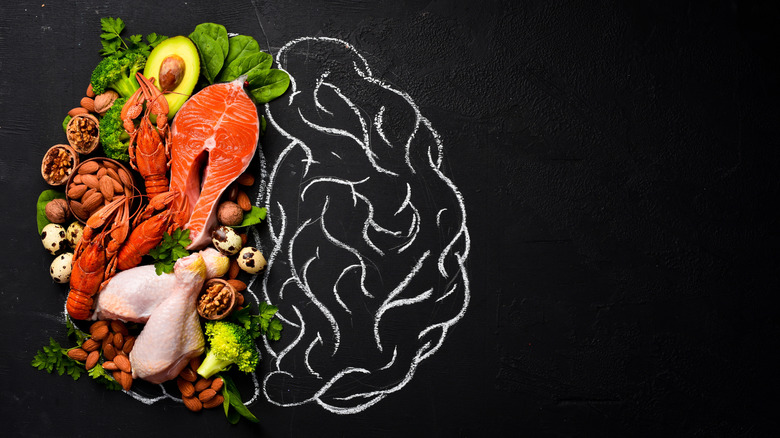4 Ways You Can Protect And Improve Your Memory, According To Science
Memory acts as the invisible thread linking our past experiences to present awareness, shaping who we are and how we learn. Far from being fixed, though, memory is a dynamic system. It's constantly rewiring in response to how we think, move, and live. Neuroscience has finally figured out more about how memory works, now showing that memory can be strengthened and protected through targeted, evidence-based habits that influence the brain at both cellular and behavioral levels.
Research from cognitive psychology also reveals that active recall and spaced repetition enhance long-term retention by reinforcing neural connections rather than relying on passive review. Meanwhile, some medical studies highlight the profound influence of physical health on cognitive performance: Regular aerobic exercise boosts blood flow to the hippocampus, omega-3 fatty acids support neuronal integrity, and quality sleep helps consolidate new information.
Together, these findings show that memory is not merely a mental skill, but a reflection of overall brain health, responsive to how we study, eat, sleep, and move. Understanding these mechanisms empowers anyone to cultivate sharper, more resilient memory, whether the goal is mastering new information or maintaining cognitive vitality.
Develop healthy habits
Healthy habits such as proper nutrition, consistent sleep, and regular exercise are among the most powerful tools for preserving and enhancing memory throughout life. After all, memory relies on the brain's ability to form and strengthen neural connections, a process deeply influenced by our physical health.
A balanced diet rich in omega-3 fatty acids, antioxidants, and vitamins supports neuronal integrity and reduces oxidative stress, a key factor in cognitive decline. Studies show that omega-3s (particularly DHA) enhance synaptic and hippocampal function, which are essential for learning and memory formation. A diet that emphasizes fish, nuts, and plant-based foods (the so-called Mediterranean pattern) has also been linked to slower memory decline and reduced dementia risk.
A healthy diet isn't the habit that can help improve your memory, though. Regular sleep acts as the brain's memory consolidator: During deep sleep and REM stages, new information is reorganized and transferred from short-term to long-term memory storage. Chronic sleep deprivation disrupts this process, impairing both recall and learning efficiency. Physical exercise, especially aerobic activity, increases blood flow to the brain, stimulating the growth of new neurons in the hippocampus, the brain's memory hub. Exercise also elevates levels of brain-derived neurotropic factor (BDNF), a protein crucial for maintaining healthy neural circuits.
Together, these habits create a foundation for optimal cognitive performance. By fueling, resting, and oxygenating the brain, you're not only protecting your memory from age-related decline, but also sharpening focus, recall, and learning capacity at any age.
Spaced learning and active recall practice
Spaced learning and active recall are two of the most effective, research-based techniques for improving memory and increasing the speed at which you can learn new information. And those two techniques work best when used together.
Spaced learning simply means reviewing new information at gradually increasing intervals, instead of cramming everything into one studying session. By revisiting material just as it starts to fade from memory, you strengthen your ability to recall it later. For example, you might review new information a day after learning it, then again three days later, a week later, and so on. This timing helps your brain store information permanently.
Active recall, on the other hand, involves testing yourself rather than passively reading. Asking yourself questions, using flashcards, or trying to write down what you remember from scratch forces your brain to retrieve information. It triggers the same process used when recalling memories in real life. Each successful recall strengthens those mental connections.
When combined, spaced learning and active recall create a powerful feedback loop. Spacing tells you when to study, and active recall tells you how to study. Apps like Anki or Quizlet use this combination automatically, adjusting the timing of reviews based on how well you remember each of them.
The mind palace method
The mind palace, also known as the "method of loci," is one of the oldest and most effective mnemonic training methods ever developed. Dating back to ancient Greece, it works by linking information you want to remember with familiar locations in your mind. These places can be real, like a room in your house or a path you walk daily. But it can also be a fictional space that you imagine vividly.
The idea behind this method is simple. Your brain is naturally good at remembering places and visual details. By turning abstract information (such as names, lists, or facts) into mental images and placing them along a familiar path, you make those memories easier to retrieve later. For instance, if you're memorizing a grocery list, you might imagine a loaf of bread on your doorstep, apples rolling down the hallway, and milk spilled over the kitchen counter. When you mentally walk through your house, these vivid images cue each item on your list.
Modern neuroscience supports how this works. fMRI studies show that people using the mind palace technique activate the brain's spatial memory regions — including the hippocampus — which are also responsible for navigation and long-term memory formation.
Building a mind palace takes practice. In time, it becomes a creative and reliable way to organize complex information, such as speeches or study notes. The more vividly you imagine each location and its association, the stronger your recall becomes. It's memory training that turns imagination into a powerful cognitive tool.
Learning a new skill
Learning a new skill, such as playing an instrument or speaking a new language, does far more than add to your abilities. It actively strengthens your brain and supports long-term memory. Each new skill challenges the brain to form fresh connections between neurons, a process known as neuroplasticity. This rewiring not only helps you master the skill itself but also enhances your overall ability to learn and retain information.
When you learn something new, you're actually promoting the growth and survival of neurons, a process that's generally determined by proteins like brain-derived neurotrophic factor (BDNF). These biological changes make the brain more adaptable and improve memory consolidation. Research shows that adults who regularly engage in skill-based activities tend to maintain sharper memory and slower cognitive decline as they age. Even short periods of focused learning can lead to measurable improvements in attention, working memory, and problem-solving.
The key is novelty and challenge. Choosing skills that are engaging and require focus pushes the brain out of its comfort zone, strengthening the networks responsible for learning and recall. In essence, every time you take on a new skill or hobby, you're giving your memory a full-body workout. You keep it flexible, resilient, and ready for the future.




